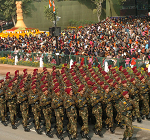India’s union budget for 2014-2015 will be announced on 10 July 2014.
Sameer Patil, associate national security fellow at Gateway House, outlines the key defence spending areas that should be addressed in the budget.
Statement:
“In budgeting for India’s defence spending, the government’s first priority should be to hasten India’s military modernization process which includes the acquisition of military weapons and equipment.
In the new budget, the government needs to allocate funds to three major defence areas – pending naval acquisitions, indigenisation of defence production and critical infrastructure.
a) Boosting naval capabilities: The budget has to keep pace with the growing demands of the armed forces, particularly the Indian navy. While an increase in the Indian navy’s defence budget is necessary, in the new budget, the government needs to focus on better allocation of funds. In addition to paying the salaries of military personnel, the government must allocate funds for pending naval acquisitions such as multi-role helicopters and amphibious aircrafts. Talks for these acquisitions are currently in advanced stages – the government needs to conclude the deals and allocate some funds to expedite implementation.
b) Indigenization of defence production: Despite the government’s emphasis on promoting indigenous defence production, there has been no notable progress so far. In this budget, the government needs to announce policy measures for scaling up the involvement of local private shipyards. Local shipyards have played a small but impressive role in increasing our naval capabilities – they need to be promoted. Easier credit access and tax holidays for local R&D efforts are measures that will enable the local shipyards to commit more funds.
c) Critical infrastructure: Given that the critical national infrastructure plays a significant role in sustaining our national security, the government needs to announce a critical infrastructure fund which will identify the most vulnerable infrastructure facilities in the public and private sectors and upgrade those to meet the emerging cyber threats.
Overall, the government should be proactive in understanding the country’s military requirements. Following this, the government should provide sufficient funds for these requirements and make sure the allocated funds are properly utilised.”
For more information or interview requests, please contact Reetika Joshi at joshi.reetika@gatewayhouse.in or outreach@gatewayhouse.in


